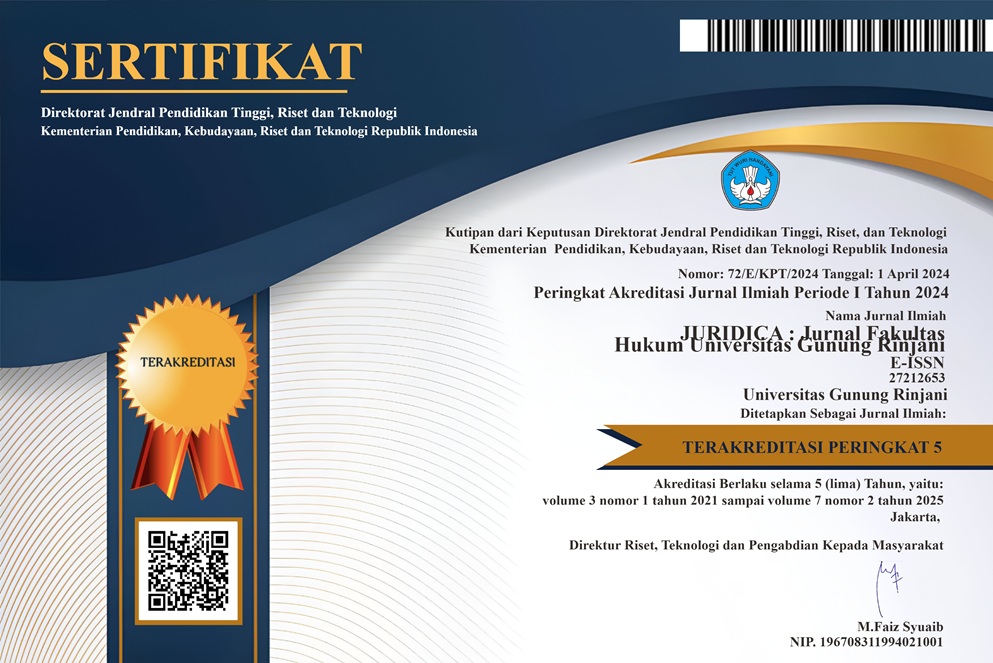ANALISIS YURIDIS PENDIRIAN DAN PEMBUBARAN ORGANISASI MASYARAKAT
(Studi Kasus Putusan Sengketa Administrasi Ormas NW dan HTI)
Keywords:
Establishment, Dissolution, Civil Society OrganizationsAbstract
The spirit of building a nation began before and after Indonesia's independence. One of the ways is by establishing a Social Organization, the provisions of the Law on Mass Organizations under the Staatsblad 1870 Number 64 concerning Legal Entities (Rechtspersoonlijkhied van Vereenigingen) which were established before the Proclamation of Independence of the Republic of Indonesia and consistently maintaining the Unitary State of the Republic of Indonesia. as a national asset and do not need to register in accordance with the provisions of this Law. Organizations are required to have AD and ART to be used as guidelines in carrying out organizational activities, ratification as a Association Legal Entity issued by the Minister of Law and Human Rights. CBOs are prohibited from spreading teachings and actions that are contrary to Pancasila. So that Law Number 17 of 2013 concerning Mass Organizations is no longer sufficient, finally the government issued Government Regulation in Lieu of Law Number 2 of 2017 to explain more broadly about prohibited teachings / understandings. The research method used is normative research, with the focus of the study being on the statutory approach to the establishment and dissolution of Community Organizations and reviewing the Supreme Court Decisions related to the establishment and dissolution of CSOs by taking case studies of NW and HTI decisions. The purpose of this study is to find out how the procedures for establishing community organizations and the dissolution mechanism of CSOs. Furthermore, conducting a case study based on the Decision of the Supreme Court Number 37K / TUN / 2016 concerning the establishment of Nahdlatul Wathan (NW) and Decision Number 27K / TUN / 2019 concerning the dissolution of the Indonesian Hizb ut-Tahrir Association (HTI).
References
M. Billah dan Abdul Hakim G. Nusantara, Masyarakat sosial, Bandung, Angkasa, 1998
Soekanto, Soerjono. Pengantar Penelitian Hukum,Cetakan Ketiga, Jakarta:Iniversitas Indonesia (UI-PRESS). 1986
Soetandyo Wignjosoebroto, “Sebuah Pengantar Ke Arab Perbincangan Tentang Pembinaan Penelitian Hukum Dalam Pjp Ii” BPHN Departemen Kehakiman, 1995.
Tirta Nugraha Mursitama, Pengkajian Hukum Tentang Peran Dan Tanggungjawab Organisasi Kemasyarakatan Dalam Pemberdayaan Masyaraka, Jakarta:Pusat Penelitian Dan Pengembangan Sistem Hukum Nasional Badan Pembinaan Hukum Nasional Kementerian Hukum Dan Hak Asasi Manusia RI, 2011
Mahkamah Agung Republik Indonesia, Putusan Nomor 27 K/TUN/2019
Mahkamah Agung Republik Indonesia, Putusan Nomor 37 K/TUN/2016
Indonesia, Undang-Undang Dasar Negara Republik Indonesia 1945
Indonesia, Undang-Undang Nomor 8 Tahun 1986 Tentang Perubahan atas Undang- Undang Nomor 2 Tahun 1986
Indonesia, Undang-Undang Nomor 17 Tahun 2013 Tentang Organisasi Masyarakat
Kitab Undang-Undang Hukum Perdata
Published
How to Cite
Issue
Section
Copyright (c) 2019 M. KHAIRUL WARDI

This work is licensed under a Creative Commons Attribution-NonCommercial-ShareAlike 4.0 International License.








